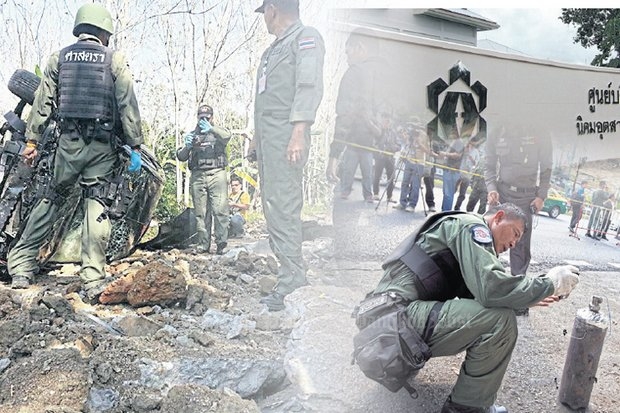
The appointment of the army chief's younger brother, Lt Gen Piyawat Nakwanich, as the 4th Army Region commander, does not bring a new sense of hope for peace in the restive deep South.
This high-level promotion along with other military reshuffles, a new structure and ambitious project proposed by the government will in fact remain a stumbling block to the peace process in the troubled three southernmost provinces.
Lt Gen Piyawat, a brother of outgoing army chief Gen Thirachai Nakwanichi's, is a former army adviser who rose to the top job in the region without previous credentials in commanding any combat units. He, however, was not a new face there. He has worked with southern intelligence units throughout his career.
However, concerns about his appointment as the regional commander are mainly due to the fact he had been taking charge of the problematic and controversial interrogation units in the deep South.

Achara Ashayagachat is Senior News Reporter, Bangkok Post.
.
Among them is his peer from the cadet class 18, Lt Gen Chinnawat Maendet who was recently promoted to the post of army special adviser. Lt Gen Chinnawat will still be in charge of the peace operations centre under the Internal Security Operation Command (ISOC)'s Forward Command.
Other newly-appointed rising stars, such as deputy regional commander Maj Gen Pornsak Poonsawat, corps commander Maj Gen Withaya Arunmethee and 15th Infantry Division commander Col Vicharn Suksong, will be working under the new reshuffle to support Lt Gen Piyawat.
Meanwhile, Lt Gen Wiwat Pathompak, former 4th Army Region commander, and Panu Uthirat, an outgoing secretary-general of the Southern Border Provinces Administration Centre are tipped to be part of the so-called Front-Line Cabinet, a new structure to solve the South's woes created by the current government. The former is a Narathiwat native and the latter is a Pattani native.
In addition to the recent reshuffles and new structure, positive news about grand plans for the region has been coming from the government. A triangular economic model, which offers extra investment incentives, greater transportation links and palm and rubber processing projects, is one of them.
The triangle refers to three strategic districts in the three provinces -- Nong Chik in Pattani, Betong in Yala, and Sungai Kolok in Narathiwat. Soon after the government's announcement of the model, bureaucrats quickly worked out details including a 6.4-billion-baht budget for a four-year operation plan.
While the military reshuffles and ambitious initiatives could pose stumbling blocks in the military, the cooperation Thailand has sought from its immediate neighbour, Malaysia, is not promising either.
Even though the countries last week confirmed their commitment to ending the violence and security threats in Thailand's deep South, they have been reluctant to cooperate on certain issues.
Malaysia was here to push for peace talks with MARA Patani, an umbrella insurgent group. But Deputy Prime Minister and Defence Minister Gen Prawit Wongsuwon said Thailand was not ready to sign the peace dialogue's terms of reference to kick off the talks, saying safety in the region must come first.
He said last month's fatal bomb blasts in six upper south provinces and in Prachuap Khiri Khan's tourist town of Hua Hin have worried Thais.
After a relatively peaceful period, deadly bomb attacks have re-erupted in the deep South, with targets ranging from trains, hotels and schools. These include a recent bombing outside a primary school in Narathiwat's Tak Bai district which killed a young pupil and her father.
Malaysia, meanwhile, failed to give convincing updates to Thailand on its investigation into Samsung Hero mobile phones bought in Kuala Lumpur and found at scenes of the southern blasts last month. They simply said any tourist could buy such a phone in Malaysia.
The long-time request to settle the Thai-Malay dual citizenship headache also did not progress well. The argument on the need for biometric identification remains an excuse for why Kuala Lumpur could not "arrest" any core perpetrators of the separatist movements wanted by Thailand.
While the man facilitating the peace talks in Malaysia, former special branch police director Dato Samsamin joined the talks last week, the Thai police chief Gen Chakthip Chaijinda was not there.
Civil society groups are not positive about the future of the region given the pressure which bureaucrats are applying to locals.
They have no choice but to stay hopeful that things might get better.
ISOC figures, which are different from those of local NGOs, suggest that incidents and casualties have decreased during the past 12 years, from 396 attacks and 93 deaths in 2004, peaking in 2007 with 1,821 incidents and 713 deaths, to 193 incidents and 116 deaths this year.
They could feel the continued hawkish tone among policy-makers.
Rear Admiral Somkiat Ponprayoon, deputy director of ISOC's Unit 5 which is in charge of the Deep South, last week said the peace talks are meant to be carried out for Thais.
"Those talking about self-determination or even discussing human rights problems should be careful as they are not helping bring peace to the southern region," he said.
So for some observers, those with aspirations for the talks which differ from the ones drawn out by the Bangkok participants will remain on the outer, with little chance of having their wishes realised.
